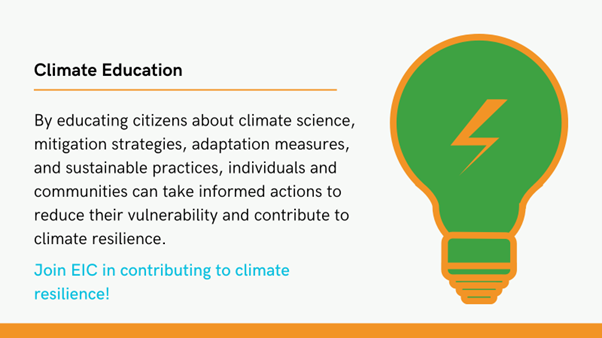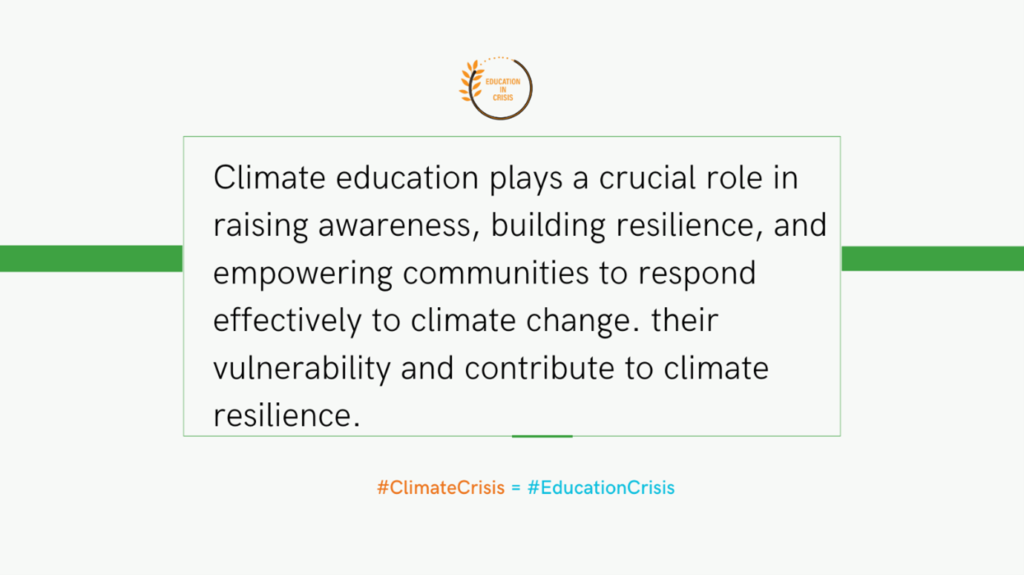EIC’s endeavours to harness the power of education to address climate change and advance inclusive, equitable and quality education for all, Climate education is not only essential for building a sustainable future but also integral to achieving the objectives of SDG 4. To build sustainable future, we must equip individuals with the knowledge, skills, and inspiration to navigate the complexities of climate change and contribute to a more resilient, equitable, and sustainable world. Together, let’s educate, inspire, and empower future generations to shape a brighter tomorrow.
Overview
In the face of the escalating climate crisis, education emerges as a powerful tool for change. Our initiative, “Plante One,” aims to integrate comprehensive climate education into school curricula and community programs. By fostering environmental literacy and empowering individuals with the knowledge and skills to address climate challenges, we strive to inspire a generation of informed and engaged global citizens on matters of climate and environment through which their actions directly affect them.
Climate education is not just about learning, it’s about empowering individuals to be catalysts for change in the fight against climate change. By empowering the minds, we are saving the Planet. EIC seeks to equip students, educators, and communities with the knowledge, skills, and motivation to create a more sustainable and resilient future for all. Together, let’s educate, inspire, and take action to protect our planet for generations to come.
Africa is particularly vulnerable to the adverse effects of climate change, including droughts, floods, heatwaves, desertification, and sea-level rise. These impacts threaten food security, water resources, health, infrastructure, and livelihoods, exacerbating existing socio-economic challenges including making education inaccessible.
The most marginalized and vulnerable children disproportionately in particular, girls and children with disabilities become the immediate victims as their education often gets interruptions with the destruction of homes and schools. By ensuring access to quality education, a sustainable and cost-effective way to improve societies’ resilience to climate change. This is why EIC calls on the global leaders and donors to acknowledge the link between education and climate change in financing decisions.
EIC’s Response
Responding to the climate crisis through Sustainable Development Goal 4 (SDG 4) requires a multi-faceted approach that integrates climate education, environmental sustainability, and climate action into education systems at all levels.


Climate education and addressing climate crises are critical issues in Africa due to the continent’s vulnerability to the impacts of climate change and the urgent need for mitigation and adaptation measures.
Integration into Education Systems: Integrating climate education into formal and informal education systems is essential for reaching children, youth, and adults across Africa. This involves revising curricula, teacher training, educational materials, and school programs to incorporate climate-related topics and foster environmental literacy from an early age. Integrating preparedness, disaster risk reduction and resilience into education programmes.
Community-Based Approaches: Community-based approaches to climate education are particularly effective in rural and marginalized areas where traditional knowledge and local practices play a significant role in adaptation. By engaging communities in participatory learning and decision-making processes, climate education initiatives can promote indigenous wisdom, local solutions, and sustainable development practices.
Youth Engagement and Empowerment: Youth engagement is a key component of climate education and action in Africa. Young people are at the forefront of climate advocacy, activism, and innovation, driving positive change in their communities and beyond. Empowering youth with knowledge, skills, and opportunities to address climate challenges can catalyze transformative action and ensure intergenerational equity.
Cross-Sectoral Collaboration: Addressing climate crises in Africa requires collaboration across sectors, including education, environment, agriculture, health, infrastructure, and governance. By fostering partnerships among government agencies, civil society organizations, academia, businesses, and international stakeholders, countries can develop holistic approaches to climate education and adaptation that address multiple interconnected challenges.
Teacher Training and Capacity Building: Provide professional development opportunities for teachers to enhance their understanding of climate science, environmental issues, and pedagogical approaches to teaching climate change. Equipping educators with the necessary skills and resources enables them to effectively deliver climate education in classrooms.
Promote Experiential Learning and Inquiry-Based Approaches: Encourage experiential learning activities, field trips, outdoor education, and hands-on projects that allow students to explore climate concepts, observe environmental changes, and engage in problem-solving activities related to climate resilience and sustainability.
Develop Green Schools and Sustainable Practices: Promote the adoption of sustainable practices within educational institutions, including energy efficiency, waste reduction, water conservation, green transportation, and eco-friendly infrastructure. Greening schools not only reduces their environmental footprint but also serves as a model for students and the broader community.
Monitor Progress and Evaluate Impact: Establish mechanisms for monitoring progress and evaluating the impact of climate education interventions on student learning outcomes, behavior change, and community resilience. Use data and feedback to inform continuous improvement efforts and ensure that climate education remains responsive to evolving challenges and needs.

